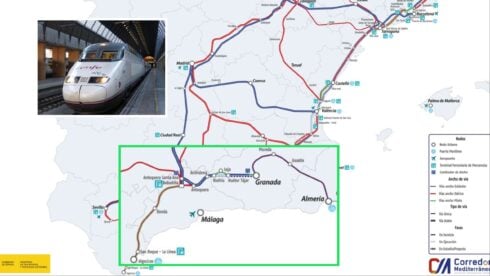IRAN’S parliament has voted to block the Strait of Hormuz in a move that could drive a spike in oil prices similar to levels last seen in 2022 following Russia’s invasion of Ukraine.
Although the ultimate decision lies in the hands of Iran’s Supreme National Security Council, there is considerable speculation that leading Iranian officials including Supreme Leader Ayatollah Ali Khamenei may back the proposal and close the shipping lane in retaliation for the United States’ recent strikes on the country’s key nuclear facilities.
Such a move would likely have devastating consequences for the global economy, including Spain.
Over 20 per cent of global oil and gas supplies flow through the Strait of Hormuz, which links the strategically significant Persian Gulf to the Gulf of Oman.
READ MORE: US air tankers arrive overnight at Spanish base as Trump declares ‘Iran cannot have a nuke’

In the first half of 2023, around 20 million barrels of oil passed through the channel every day, located south of Iran and just 33 kilometres wide at its narrowest point.
Experts fear that Iranian officials could use their crack fighting force, the Islamic Revolutionary Guard Corps, to prevent ships from passing through by laying mines using fast attack boats and submarines, or launching attacks on commercial vessels.
Closing the strait would bring oil exports from key countries in the Middle East, such as Saudi Arabia, to a standstill.
Sir Alex Younger, former head of the UK’s intelligence agency MI6, told the BBC that ‘closing the strait would obviously be an incredible economic problem given the effect it would have on the oil price’.
According to analysts, oil prices could surge up to €130 a barrel in the event of a full blockade. Brent crude oil, a key marker for oil prices, is currently trading at €67 a barrel, having already increased by over five per cent since Israel launched missile attacks on Iran earlier this month.

Kallum Pickering, chief economist at Peel Hunt, warned The Times that a closure of the Strait of Hormuz would depress global GDP, push up inflation, and even potentially trigger an economic shock akin to that of the 1970s.
On that occasion, a decision by Arab countries to restrict oil exports to countries supporting Israel during the 1973 Yom Kippur War saw oil prices rise by nearly 300 per cent.
Political instability in Iran has a long history of provoking sudden, destabilising increases in the price of oil. In 1979, following the Iranian Revolution, the price of crude oil doubled over a period of 12 months following a four per cent decrease in global oil supply.
The latest potential increase in prices comes after President Donald Trump claimed American forces had ‘completely and fully obliterated’ Iran’s three main nuclear sites at Natanz, Isfahan and Fordow.
B-2 stealth jets from Missouri released 14 30,000-pound GBU-57 so-called ‘bunker-buster’ bombs in an attempt to destroy the facilities, which the US and Israel claim Iran is using to enrich uranium for use in a nuclear bomb.
Although Spain does not import oil or natural liquid gas from Iran directly, it does from nearby countries including Saudi Arabia, and would still be prone to any uncertainty on the global markets.
READ MORE: Spanish petrol cheapest in four years after oil prices collapse

According to estimates, Spain would lose five million barrels of oil a month if the strait were to be closed, equivalent to €412 million.
In the year up to March, Spain bought approximately 16 million barrels of oil from producers in the Middle East – principally Saudi Arabia and Iraq.
If the blockade goes ahead, residents in Spain would likely feel the impact at the pump, with prices in petrol and diesel skyrocketing in response to limited supply.
Despite this, experts remain optimistic that a deal can be struck to avoid Iran blocking the strategically vital Strait of Hormuz.
Central to this belief is the reality of Iran’s very own dependence on oil exports, which would be hampered by any attempt to block ships leaving the Gulf.
Secondly, key Tehran ally China would also be negatively impacted by the move. China, the world’s biggest oil importer, buys about five million barrels a day from countries in the Middle East, helping to prop up the Iranian regime, so any decision to launch a blockade would be an act of economic self-harm.
READ MORE: Spain and UK lobby Trump to delay 3.5% NATO defence spending target
Following the latest strikes on Iranian soil, Spanish prime minister Pedro Sanchez called on the US, Israel and Iran to de-escalate and come round the negotiating table.
In a tweet, the socialist premier warned: “The Middle East is on the brink of collapse. There is an urgent need for restraint and de-escalation, for diplomacy and dialogue. We mourn the loss of civilian lives in this conflict.
“Iran must never have access to nuclear weapons, but stability in the region can only be achieved at the negotiating table, with full respect for international law.
“We need a diplomatic solution that establishes a comprehensive framework of peace and security for all.”
Click here to read more Spain News from The Olive Press.








